No woman can live up to India’s impossible beauty standards
Last week, artist Tara Anand began posting curious illustrations to her Instagram: girls of varying brownness smiling as their eyes were shielded by Pantone color cards.


Last week, artist Tara Anand began posting curious illustrations to her Instagram: girls of varying brownness smiling as their eyes were shielded by Pantone color cards.
Tan, 478C. Wheatish, 7644C. These women were paint chips.
And under each illustration was a poem about skin. How it feels, how it looks, how others see it, how we are punished and judged for it.
“She sat in front of the mirror in her button-down shirt, the table in front of her/Covered with hairpins, flower rings, jewelry, a pair of scissors/And bottles and bottles of peach-colored make-up. She closed her eyes as her face/Changed shades, getting lighter and lighter with every base.”
Kajal (Magazine) spoke with the poet behind the words, Anoushka Agrawal, about why she felt this project was so important.
“The primary motivation behind the idea of Shade Card was my personal experience as a dark-skinned girl,” Agrawal said. “For a long time, I grew up being very conscious of my complexion, either because I was teased about it in school or because of the snark comments adults around me made. It took me a long time to be comfortable with my complexion and to stop thinking of it as a weakness, and a lot of that was because I started understanding colorism increasingly as I grew older.”
The Shade Card series, Agrawal said, was about exploring colorism and how it affects us so deeply. Complexion and beauty “should have no correlation,” she says.
Check out every piece in the series below.
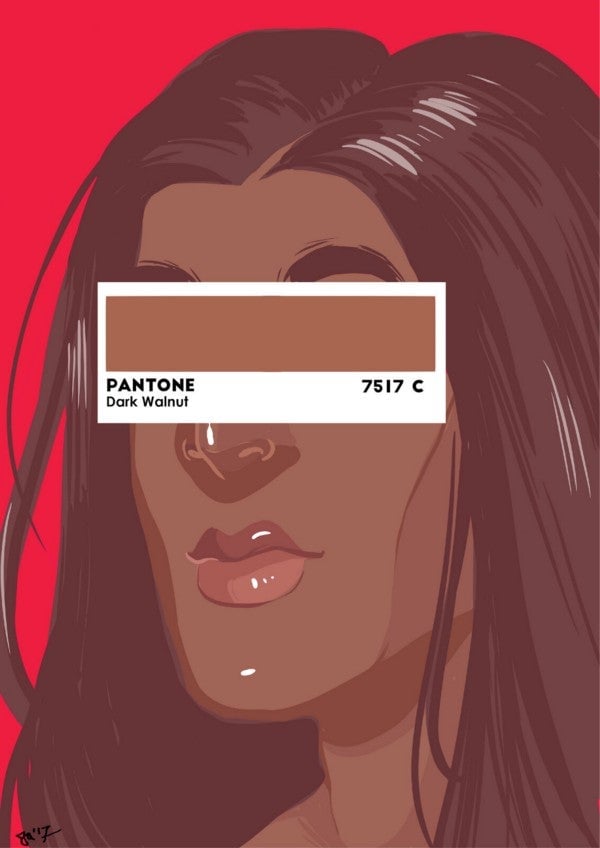
1.
Tired but happy, she took a sip out of her water bottle
And stepped out of her car. She walked to the lift of her building, her little
Earrings dangling from her ears as sweat dangled from the apex of her chin.
She had a big performance the following week, because of which her shin
Had begun to ache with the long hours of rehearsal, but she didn’t mind.
Her Indian classical dance form allowed her to leap, to fly, to find
Within her the beauty that she had for years not been able to trust.
When she danced, she transcended universes; reality turned to dust.
She straightened her kurta, wiped the moist off her cheek with her sleeve,
She shook the bag on her shoulder, to make sure she didn’t leave
Her ghunghrus behind. She stopped before the four lifts of her building’s lobby, smiling at the watchman
Who didn’t smile back. The doors of the lift opened; she entered and suddenly stopped, deadpan
When she heard the lady next to her speak. The lady was older, bigger, and had tremendously heavy make-up on;
She adjusted her ridiculously shimmery sari and looked at the object of scorn
In front of her, at the representative of the category of people that was inferior to her own. “Whose house do you work as the maid in?”
For a minute, the girl stared at her, confused. Then, glancing at her dark skin,
She understood the lady’s question. Not knowing what to say,
She mumbled something about her dance class, then quickly made her way
Out of the lift as soon as the doors opened. She felt a strange disconnection
To her own self. Never before had she been more conscious of her complexion.

2.
‘You’re caught!’ the girl threw her head back and laughed, her eyes small with delight
As she pulled her friend, the thief, into the jail. She could never lose, not without a fight.
Her friend rolled his eyes and giggled, retiring to the ground
As she ran out again, to catch the other thieves who were waiting to be found.
She scanned the back of every pillar, inspected the space below every chair,
She flew through the hallways, ran up flight after flight of stairs.
One by one, she caught all the speedy, conniving thieves, returning
To the jail triumphant each time. Her stomach churning
With delight, she declared the winning group. ‘The police have won!’
The rest of the police force high-fived one another, the sun
Making their wide eyes reflect every ray that hit them. They
Picked up their water bottles as the school bell yelled, calling to midday.
‘We won’t call her to play with us tomorrow,’ one of the boys said, as they scampered back to class,
‘I’m telling you, she cheats. How else can she be that fast?
‘Plus,’ he added, in a patronizing tone,
‘She’s too dark.’ The girl stopped and stayed right where she was, alone.
Her pride faded away, dripping through her dusky skin,
She didn’t want to fight anymore, she didn’t want to win.
She threw herself onto the ground and buried her head in her hands,
She looked at her skin, confused. She didn’t understand
Why her complexion mattered to them. Without another word,
She slumped back into her seat, dejected, discouraged, unstirred.
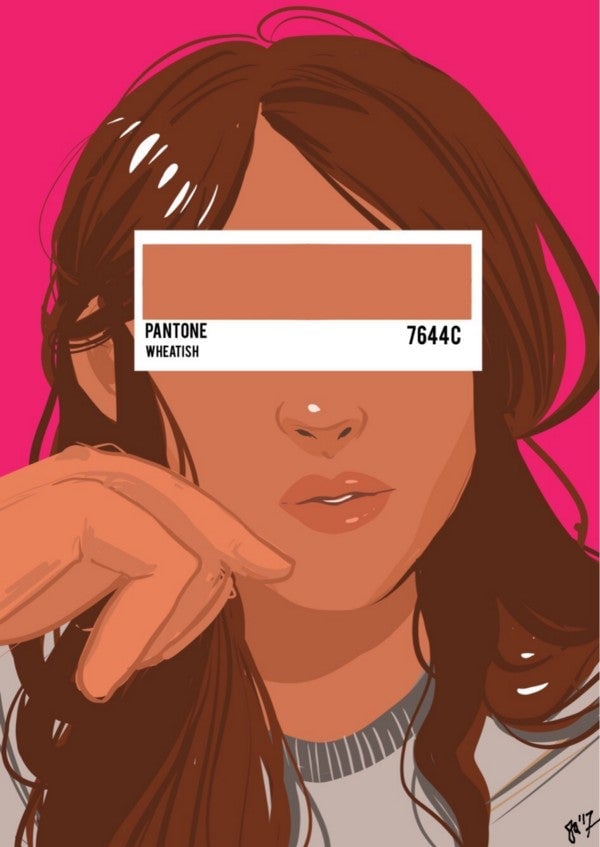
3.
Historic train stations, art galleries, beaches that stretched for a thousand miles.
She loved everything about her city — its crowd, its chaos, the warm smiles
She was greeted with each time she entered her favorite café. She loved its
people –
She loved how liberated they were; fearless, friendly, always in a hurry and still
So alive. She hailed a taxi, stepped in, and was about to become one with the blur
Of trucks and cars and motorbikes on the street, when a voice stirred
Her back into reality. “Are you from Bombay?” the taxi driver asked,
Looking at the girl through the rearview mirror; the bottom half of his dark face
masked
With a thick moustache. The girl nodded yes, before adding, “But originally, I’m
from South India.”
The driver’s eyes widened as he tore them away from the road to look at her. As
the car
Slowed down in front of a traffic signal, he continued, “I am from the South as
well,
But I can’t believe you are too! I definitely couldn’t tell;
With your light complexion, I assumed you’re from the North or the West of
India. It’s good
That you don’t look like you’re from the South! You should
Be happy,” The driver said, touching his face as he looked at his own reflection in
the rearview mirror,
And sighing. Confused, the girl turned her
Face back towards the window, and watched her city speed by.
Her city, with its palm trees and bright lights. The Mumbai
That allowed all voices to be heard, big or small. The Mumbai that was an
amalgamation of all things Indian;
That allowed all voices to be heard; made every opinion
Matter. The city that brought together cultures from every corner of the country,
The city that was supposed to accept all religions, all ethnicities, all kinds of
people. The city that didn’t discriminate; the city that was happy.
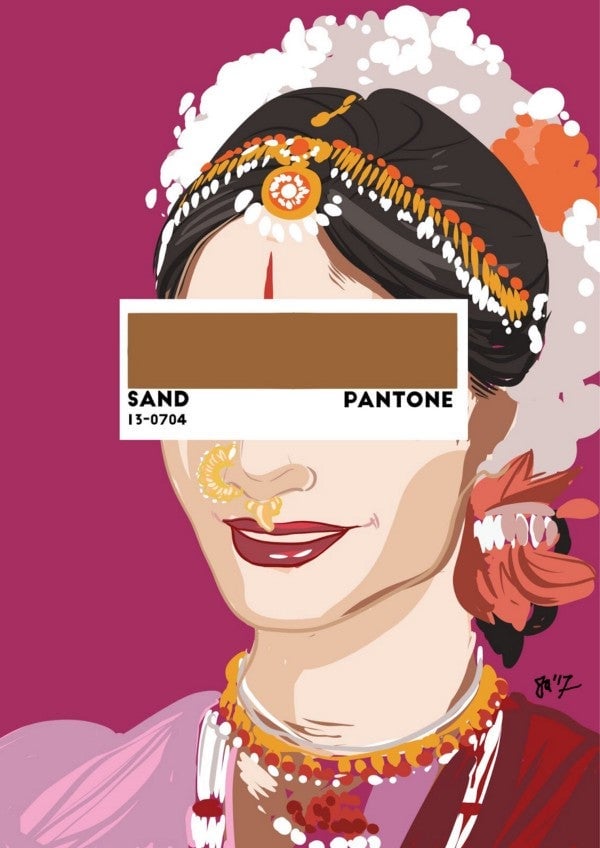
4.
She sat in front of the mirror in her button-down shirt, the table in front of her
Covered with hairpins, flower rings, jewelry, a pair of scissors
And bottles and bottles of peach-colored make-up. She closed her eyes as her face
Changed shades, getting lighter and lighter with every base.
Her eyes stung as they were painted darker to stand out against the fairness, and a tear ran down
Her cheek. ‘Don’t worry’, the make-up artist sighed, applying yet another round
Of foundation. The girl had everything she needed for her performance –
Her costume, her choreography, her concentration, her confidence.
That’s all she needed, didn’t she?
She slid her bangles onto her wrist, three
On each arm, and tightened the gold belt on her hip.
She was getting late;
She packed her bag and was about to leave when, a loud, ‘Wait!’
The make-up artist walked towards her with a peach-coloured sponge and
Covered her arms with the colour; from her shoulders down to the tips of her hands.
He looked at the girl and smiled. “Now, you’re ready.” As the girl walked out, she contemplated
How much the world had changed from when her dance form was first created.
It didn’t matter that she was to depict Lord Shiva in her performance that day;
Shiva, whose skin was dark as night. It didn’t matter that she was going to portray
Goddess Kali — again dark-skinned, fierce and powerful. No –
In the final performance, regardless of the perspective a dancer wishes to show,
Regardless of the statement she tries to make, regardless of the story in her art,
She is made fairer; ‘prettier’, such that it is impossible to tell her apart
From the others. It didn’t matter that she wanted to use her dance to empower,
To change the narrative, to tell stories from the nooks of reality; to flower.
With all the modernity around her, she was still a dark girl who took hours
To become lighter; to ‘look’ like a classical dancer. She wished she had the power
To bring a little change — to bring the contemporary
Into a traditional dance form, and a seemingly traditional society.
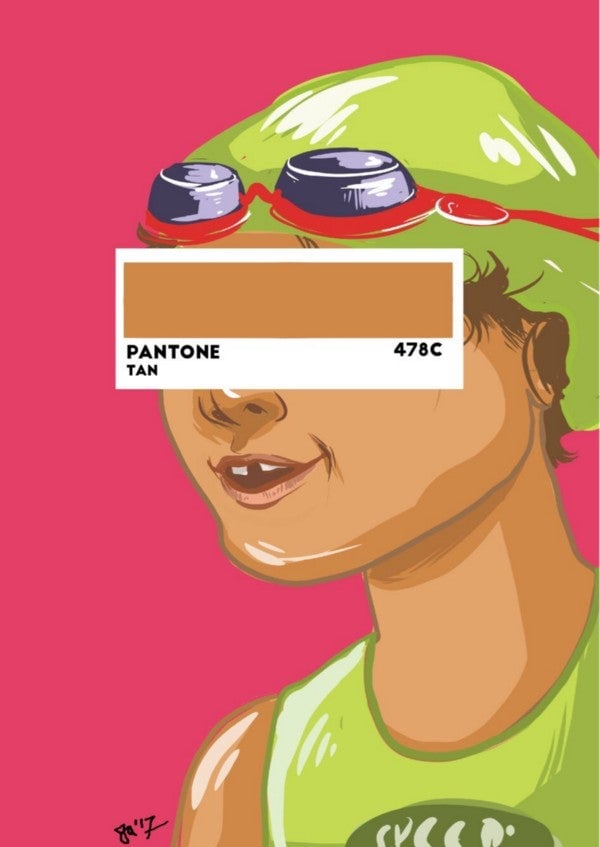
5.
She tilted her head. The fish swam right and left, up and down; in all directions.
It was as if they were creating and breaking patterns; always making corrections
To the art they seemed to be producing with their fins. She wished she had fins,
too.
She wished she had a tail, she wished she has scales, she wished she was painted
a hundred different hues
Just like the fish. She tore her eyes away from the tank and ran into her
bathroom
As fast as her 7-year old feet could take her. She ran out in her blue flippers and
her pink bathing suit; one could only assume
That she adored the sport. She put on her lemon-green cap and her red
Goggles, and, standing in front of her mirror, she fitted them on her head.
Within seconds, she was out her door and inside the swimming pool of her
residential building.
She suddenly couldn’t tell what she was doing anymore. She didn’t know if she
was sprinting,
Dancing, or flying. She didn’t know which world she was in; it couldn’t have been
the real one.
She felt like just like the swordtails in the fish tank. She wanted to scream, run,
Jump and merely float, all at the same time. The water made her powerful.
Suddenly, she felt a tug. She felt someone pullHer to the surface of the pool. “What are you doing?” Her grandmother asked,
angry.
“You cannot swim now! It is summer, do you not see
The scorching sun? You will get terribly tan,” she continued, persuading the girl
Out of the pool; out of her comfortable, peaceful swirl
Of happy and into the safe shade of her apartment. The girl ran
Into her room, furious. All she wanted to do was swim. She didn’t see anything
remotely wrong with a tan.
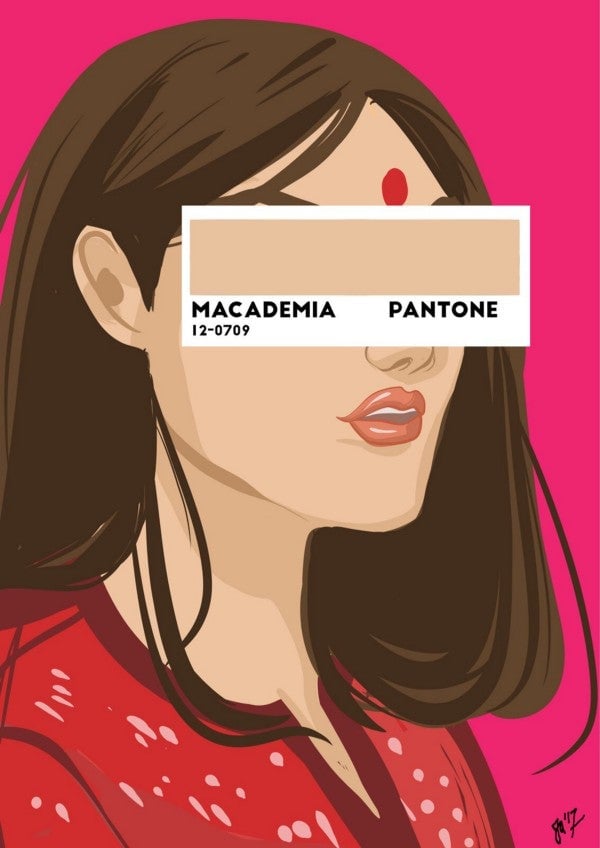
6.
She laid out her brand-new lehenga on her bed, admiring it.
She didn’t mind how expensive it was, or that its fit
Wasn’t the best. She thought it was beautiful; she thought its bright
Yellow color made her seem happier than usual. She stood in front of the lights
Of her bedroom mirror, put the lehenga on, and was, within minutes, out of her house
And on her way to her friend’s Diwali party. She adjusted her blue blouse
Before entering the venue. Diwali was her most favorite festival; she adored the sparkling fireworks
And the glimmering lamps; the exquisite food and all its other quirks.
She rang the doorbell and greeted her friend with an embrace.
She wasn’t surprised to see many strangers at the party; her friend was a popular face
In every social circle there was. She was in conversation with a group when an unfamiliar man
Joined in. After introducing themselves to one another, they began
Talking about the history of the festival; the man didn’t know
Enough about its reasons for celebration. The girl felt her excitement grow –
It was common knowledge that she knew absolutely everything about Hindu mythology.
She knew everything about the Ramayana — the tale of the origins of Diwali — right from its chronology
To its most intimate details. When the man turned to her and said,
“You must be more uninformed than me about this!” she jerked her head
Back in surprise. Offended, she asked, “Why so?”
“Well, your white skin must mean you aren’t from the country, so you wouldn’t know
Enough about its culture, would you?” She shook her head, appalled. She
Didn’t realize that her complexion could strip her off her culture completely.
This article was originally published on Kajal Magazine. Read the original article. We welcome your comments at [email protected].